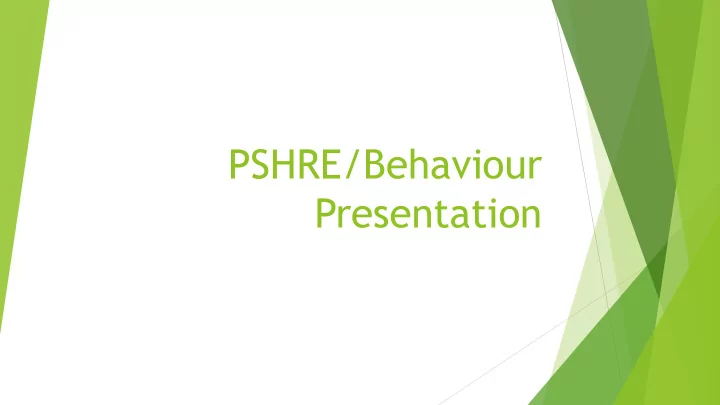

PSHRE/Behaviour Presentation
Statutory from September 2020 Primary Schools: Relationships Education and Health Education (RHE)
Respect the backgrounds and beliefs of pupils and Enable all to flourish parents Provide pupils RSHE Be inclusive of all with the knowledge they Provide a safe space need of the law to discuss the world Age and Taught sensitively in which they live developmentally and inclusively appropriate curriculum
Relationships Education, Relationships and Sex Education (RSE) and Health Education Statutory guidance for governing bodies, proprietors, head teachers, principals, senior leadership teams, teachers Dfe ‘To embrace the challenges of creating a happy and successful adult life, pupils need knowledge that will enable them to make informed decisions about their wellbeing, health and relationships and to build their self-efficacy. Pupils can also put this knowledge into practice as they develop the capacity to make sound decisions when facing risks, challenges and complex contexts. Everyone faces difficult situations in their lives. These subjects can support young people to develop resilience, to know how and when to ask for help, and to know where to access support .’
Relationships ‘The focus in primary school should be on teaching the fundamental building blocks and characteristics of positive relationships, with particular reference to friendships, family relationships, and relationships with other children and with adults .’
How do we do this at Thurnham? Year R/EYFS
Some of the resources we use in Year R.
ho
Relationships in Year 1 and 2 ‘This starts with pupils being taught about what a relationship is, what friendship is, what family means and who the people are who can support them. From the beginning of primary school, building on early education, pupils should be taught how to take turns, how to treat each other with kindness, consideration and respect, the importance of honesty and truthfulness, permission seeking and giving, and the concept of personal privacy. Establishing personal space and boundaries, showing respect and understanding the differences between appropriate and inappropriate or unsafe physical, and other , contact’
Example – Year 1 Feelings
Relationships
Growth Mindsets
Year 2 Health and Well-being Spring Term The names for the main parts of the body (including external genitalia) and the bodily similarities and differences between boys and girls What is meant by ‘privacy’; their right to keep things ‘private’; the importance of respecting others’ privacy. About growing and changing and new opportunities and responsibilities that increasing independence may bring.
WARM FIRES OPEN DOORS Our Church of England schools should be proudly inclusive, compassionate and loving because of our Christian foundation and vision.
New Behaviour Policy
3 new Rules
We explored what they mean…
Behaviour Scripts
Traffic Light Behaviours Red Behaviours Amber Behaviours Green Behaviours
Green Behaviours Actions Rewards Thurnham Walking House points /Dojos Holding doors open for others Notes home Showing good manners Lunchtime table Behaviours for Learning Head teacher sticker Kind hands Lunchtime star Respectful Non-uniform winning house
Amber Behaviours ACTIONS: SANCTIONS Teasing Behaviour Script Calling out and talking when Verbal reminders to move to Green been asked not to several times behaviours Touching other people’s things Time out with a timer without their permission Running in school/classroom Saying unkind things/ unkind gestures Using outdoor voice in school
Red Behaviours: ACTIONS: SANCTIONS: Unwanted Physical Contact Thinking time with egg timer in another class – calming time Something that endangers themselves or others Miss some playtime/ activity Damaging another person’s property Visit to Mr James / Mrs Pateman Using hurtful or inappropriate Phone call home language An apology letter/picture Consistently doing Amber behaviours
Recommend
More recommend